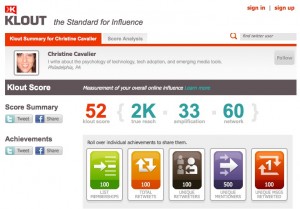Perhaps to tweet is to dream, in a playground of gods and men. Perhaps Twitter is a pool of reflection, a mirror of ourselves. We tweet, we wait for replies, we wait for the coveted retweet, we wait to see our own reflections ripple through the pond of connections.
Providing the magic mirror to see one’s Twitter influence is the task of measurement applications like Klout, Twitalyzer and PeerIndex. To put it simply, these services try to give you a number by which to compare yourself to other users. If you have a high score, the theory is that a person has a lot of “influence” (the power you have to sway someone’s opinion or behavior via your tweets). This lucky lass or lad then is worthy of more money for social media consultant fees. That’s the theory.
There’s a lot of chatter around the social media web lately because some of these web-based apps are moving from free models to a paid system. The apps are targeting huge businesses, offering to help them locate their key high-profile customers on Twitter. Then the businesses know who approach with campaign ads, offers, etc. A paid service makes sense for big businesses, but they aren’t the users of these apps. It’s the little lone Tweeter that fancies her/himself a social media genius that hits up every influence measure app on the web.
I’ve checked out most of the measurement apps (I usually score pretty well, so you can be assured this post isn’t sour grapes). I find these measures lacking in many ways. One of the biggest faults is that follower number is still a part of the algorithms used to measure influence. In the beginning of Twitter, “influence” or “reach” was measured solely by your number of followers. Smarmy services then popped up that provided swarms of followers in exchange for a bit o’ cash. People who are unfamiliar with Twitter are the only ones still fooled by this measure. Yet the follower number remains as a key data point for most of these measurement apps. A simple cash exchange can veer a user’s score toward that high-influence holy grail.
The algorithms other fatal flaws (eg not measuring back long enough, not able to analyze large follower bases, etc.) add up to a pile of only marginally useful data. The reflection that it provides is still a cloudy one. But it isn’t just the measurement algorithms I hold suspect. I disagree with the whole concept of Twitter as important. I think there’s a reason why big businesses aren’t spending too much time on “influencer” campaigns. Twitter numbers just don’t live up to the talk. Only 6% of all Americans even have a Twitter account, and a good chunk of those accounts are dormant. Also, most users are connected to less than 100 people, and most tweeted information stays on the Twitter platform.
While a high influencer score on a measurement service may get people the occasional professional opportunity, I haven’t heard many real success stories from using Twitter alone. In fact, I haven’t heard of anyone consistently translating these Twitter measurement numbers into real contracts or cash, but the rumors persist. I mean, it seems logical: If you have a lot of influence, companies will pay you to represent them or work for them. But I just don’t see this happen very often in real life. In the last 3-4 years, I’ve seen blogger after blogger and tweeter after tweeter give up on trying to leverage their hits, retweets, favorited links, etc., into viable income, or even just sponsorship to attend a conference. Twitter and blogs are just not enough content. You have to support a total platform or business which includes nationally recognized works, like books or regular speaking engagements, tv or radio shows, client recommendations, etc. You need to have a viable and reliable platform already in place to succeed as a social media consultant. Twitter by itself will get you nowhere. No matter how hard the users of Twitter stare into these enchanted influence mirrors, they will never see the clear truth. The plain fact is twitter isn’t even a part of real influence online or off. The mirror is cracked and it is always going to be.
Do your ego a favor: Keep it in perspective. Twitter is just Twitter. It exists in its own little world. It’s OK to keep it there.
____
What’s your Klout score? Do you care? What mirror do you use to understand your Twitter use? Comments, please!
-Christine Cavalier
_______________________________
Here’s some more informed reading on Twitter influence measurements:
Frank Eliason, formerly @comcastcares: http://www.eliasonfamily.info/blog/?p=1154
Social Media biggie Conversation Agent Valeria Maltoni: http://www.conversationagent.com/2011/01/why-everyone-is-now-talking-about-klout.html
Ad Age’s Matthew Creamer: http://adage.com/influencers2010/article?article_id=147957
How to view “influence” the right way: http://www.ragan.com/Main/Articles/42616.aspx



Comments on this entry are closed.